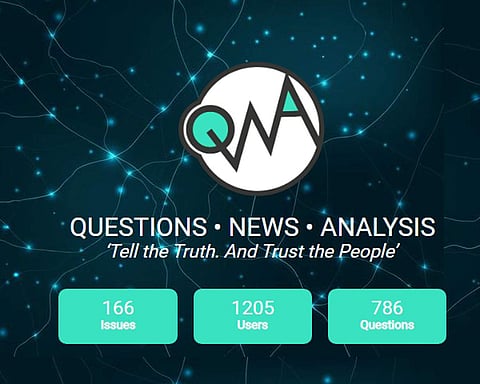

We are always curious about what others think of the issues making headlines. But how do we really know what they feel? Facebook and Twitter give us an idea, but discussions there are open-ended. "That got us thinking. What if we were to create a social media platform with data analytics at its very core, where anybody can post a poll or a question on any social issue? So, we did that with simple yes/no/maybe questions to cut out all the clutter," says Mirza Mohammed Ali Khan aka Zahaan, who co-founded QNA — an independent platform that lets users analyse social issues by seeing how different groups feel about the same subject — with Kartik Desai and Richard Sen. "QNA is an online and mobile platform with a combination of data analytics, content curation and community tools, which allows you to engage with social issues in a completely new way," adds Mirza, breaking it down for us.
As the name suggests, QNA has three sections — Questions, News, and Analysis. You can pick questions on trending headlines and topics or issues and find out who's saying what about it — while also pulling up data on where they're from, what they do and so on. QNA tracks each user's responses and allows them to compare their views with other users in the form of an overall similarity quotient — while protecting each user's data privacy.
The QNA team, led by Kartik Desai, has built the architecture, data analytics engine, and polling and sampling methodology as well as the user interface and design. "Our technology has been built by a combination of in-house resources and an IT partner with whom we have been working over the last year to build and test the pilot platform. We are currently in the process of building a mobile app," explains Mirza.
Mirza is from Chennai and has lived most of his life there.
He met Kartik through a mutual friend and discussed their passion for social impact and data analytics. Kartik is a social impact investor who has helped build and scale several social enterprises through his work at funds like Asha Impact, Lok Capital, and Aavishkaar. The idea of QNA was born in 2011 when Kartik set up What's Up Bharat, which ran a cultural centre in Delhi and organised several social-issue campaigns and surveys at over 100 colleges in India. "About a year ago, when Kartik decided to start building QNA, the two of us and our other co-founders came together and decided to take the project forward," adds Mirza.
This is India's first open-data platform on attitudinal insights. "We hope to scale our product to 10,000 users in the first two months post our launch and validate the key aspects of our thesis. We believe that generating accurate and representative insights on the large digital Indian audience can create value for our users and stakeholders including media, civil society, business, and governance," states Mirza. "As QNA generates more and more data on important and sensitive social issues, it will share these with its users as well as with a larger national audience through the publication of data research and reports."
